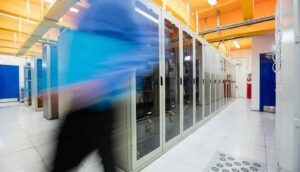Data centres could harness LNG cool energy
25th October 2019
SINGAPORE: A Singapore-based team is seeking to develop a new way of storing cold energy released from the liquefied natural gas re-gasification process and using it to cool data centres.
The rapid expansion of cloud-based services, AI, IoT and big data analytics is creating an exponential demand across the globe for data centres and, with it, the demand for cooling.
Singapore, the leading data centre hub of Southeast Asia, accounts for around 50% of the region’s data centre capacity. In addition, Singapore’s tropical climate imposes a heavy energy burden on cooling in buildings. In 2018, data centres accounted for 7% of the total annual electricity consumption in Singapore.
In an attempt to reduce this energy demand, the National University of Singapore’s Faculty of Engineering (NUS Engineering), Keppel Data Centres Holdings Pte and Singapore LNG Corporation Pte Ltd (SLNG) have joined forces to develop what they describe as a novel, energy-efficient and cost-effective cooling technology for data centres.
Maintaining that this innovation could further pave the way for more sustainable and compact data centres, leader of the project team Praveen Linga from the NUS Department of Chemical and Biomolecular Engineering said: “About 37% of the total energy consumed by data centres is used to cool IT equipment. Therefore, improving the efficiency of the cooling system can result in significant energy savings and reduce the carbon footprint of data centres. In this project, we aim to demonstrate a novel way of storing cold energy released from the LNG re-gasification process and using it to cool data centres efficiently.”
The team will develop a prototype of a new cooling medium that can achieve two key functions: firstly, to efficiently store and carry cold energy from the Singapore LNG Terminal to the various data centres, and secondly, to be circulated within the cooling loop in each data centre to perform effective cooling.
This technology, called Semiclathrate Thermal Energy Carrier System (ScTECS), can potentially enable data centres to improve their power usage effectiveness by 20%, it is claimed. The footprint of the cooling infrastructure could also be reduced considerably, they say, saving space and construction costs.
New generation thermal energy carrier
In this project, the research team will explore the use of semiclathrate hydrates slurries, which are water-based phase-change fluids, as thermal energy carriers to replace chilled water as a cooling medium in the cooling systems used in data centres. The thermal density of the semiclathrate hydrate slurry is two to five times higher compared to chilled water – this significantly reduces the amount of water and power required as well as the size of various equipment and distribution lines.
Praveen Linga explained, “While semiclathrate hydrates have been studied for purposes of gas separation, gas storage as well as thermal energy storage, the challenge lies in the ability to create them efficiently. NUS Engineering researchers will leverage our expertise in hydrate technologies and process engineering to identify a suitable semiclathrate promoter as well as develop a reactor and process design for this novel cooling technology.”
Another innovation that the team intends to pursue is to harness and utilise LNG cold energy from LNG re-gasification terminals and use it to offset the energy demands in data centres. Cold energy generated from LNG re-gasification could be stored in phase change materials and distributed to data centres for cooling purposes. As a start, Keppel Data Centres and SLNG are working together to explore ways to harness and utilise the cold energy from the Singapore LNG Terminal. SLNG will provide key technical inputs and advice related to the LNG cold energy to the team.
The process prototype demonstrating the cooling technology with a capacity of 1 tonne per day will be designed, built and operated for demonstration by 2022 at NUS.







